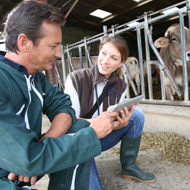NOAH outlines priorities for UK animal health sector

NOAH has stressed the need to ensure that measures are in place to facilitate trade and innovation in the animal medicines sector.
The priorities needed to deliver a thriving animal health sector following the UK’s exit from the EU have been outlined by the National Office of Animal Health (NOAH).
Following NOAH’s board meeting on 1 November, chair Cat Sayer said: “The UK must continue to be a vibrant and innovative animal health market, providing opportunities for animal medicines businesses to thrive.
“We are in a strong position in the UK to be a global centre of excellence for animal medicines, supporting both innovative product developments and a regulatory model to benefit both local and international trade.
“We need to ensure that our industry’s needs and priorities are included in discussions on how the UK exit develops,” she said.
After the UK leaves the EU, NOAH stresses the need to ensure that measures are in place to facilitate trade and innovation in the animal medicines sector.
They add that future UK regulation of veterinary medicines must incentivise product research and development - an environment where companies are encouraged to do business in the UK.
“The health and welfare of British animals, as well as our public health and food safety need to be safeguarded – our vets and animal keepers need to continue to have access to a wide range of appropriate animal medicines.
“And we must not forget our people. The animal medicines industry has many highly skilled roles. Businesses will continue to need to be able to recruit the best,” said Ms Sayer.
To identify both the risks and opportunities offered by the UK in the wake of leaving the EU, NOAH has formed a Brexit Task Force. Covering the breadth of the UK animal medicines sector, the group includes both UK based and company heads.
Furthermore, Noah is joining forces with partners across the animal health sector and engaging with relevant government departments to ensure that veterinary medicines are included in future government industrial strategy.
“In the UK consumers both encourage and expect high standards of animal welfare in food production and pet owners also want prompt and effective care. UK veterinary surgeons and animal owners need access to a full range of medicines and vaccines to protect animal welfare by preventing disease and treating illness effectively,” added Cat.



 The Veterinary Medicines Directorate (VMD) is inviting applications from veterinary students to attend a one-week extramural studies (EMS) placement in July 2026.
The Veterinary Medicines Directorate (VMD) is inviting applications from veterinary students to attend a one-week extramural studies (EMS) placement in July 2026.